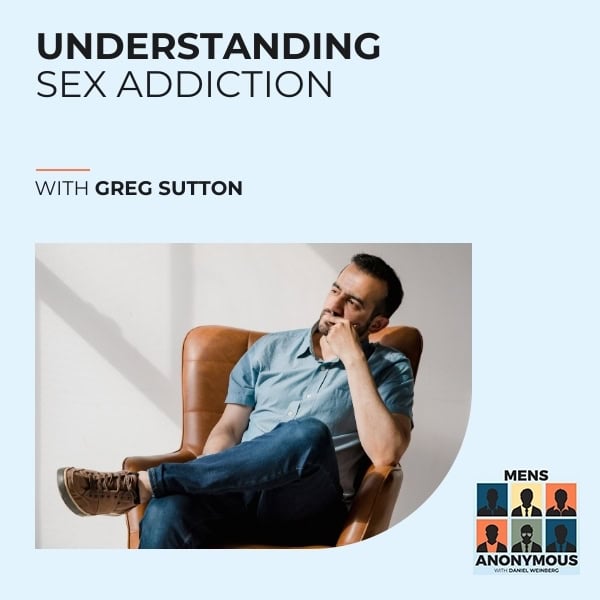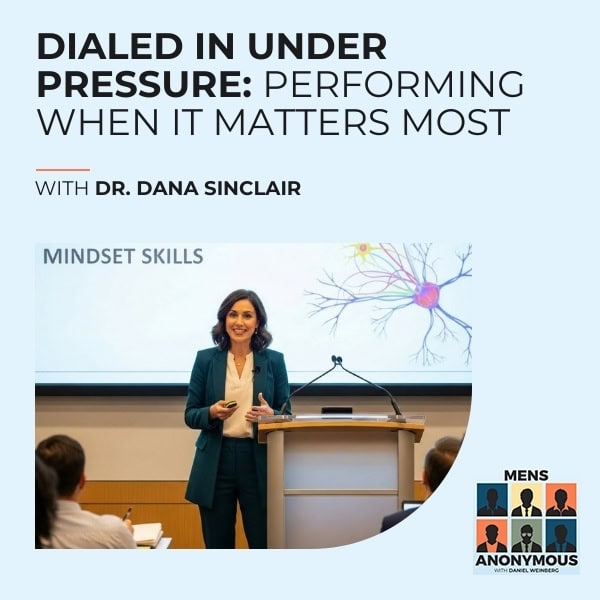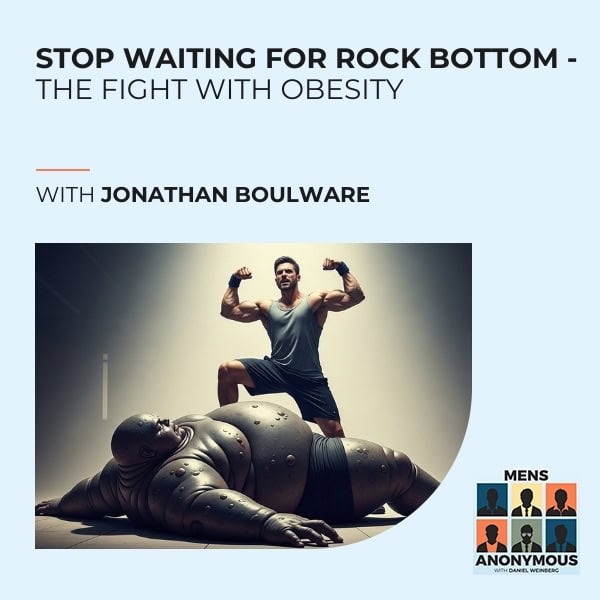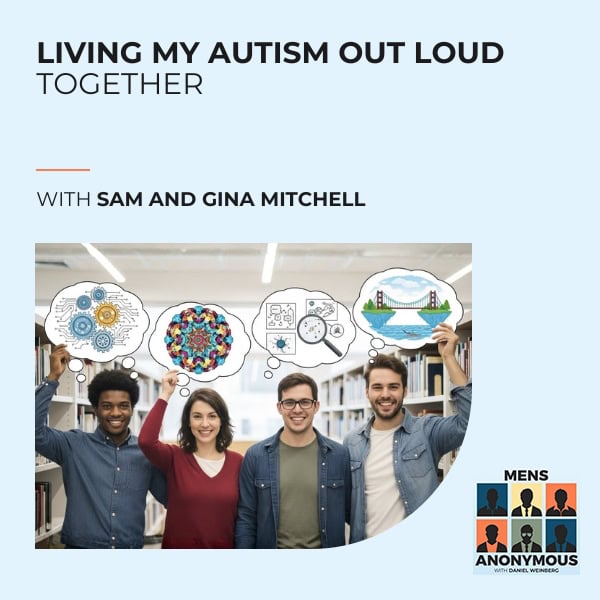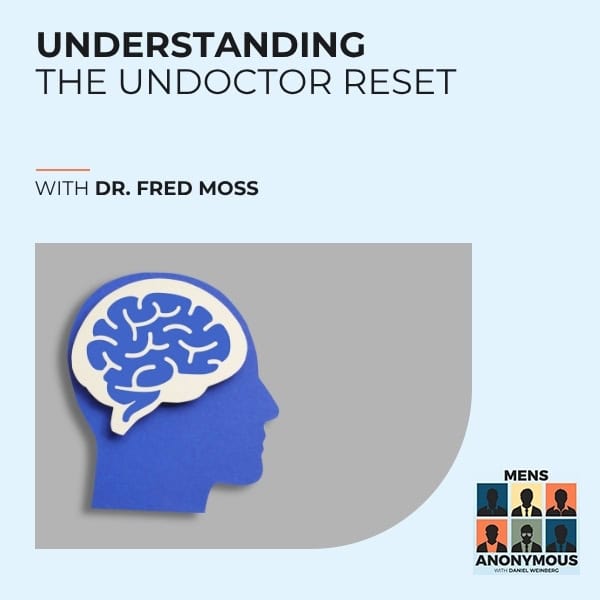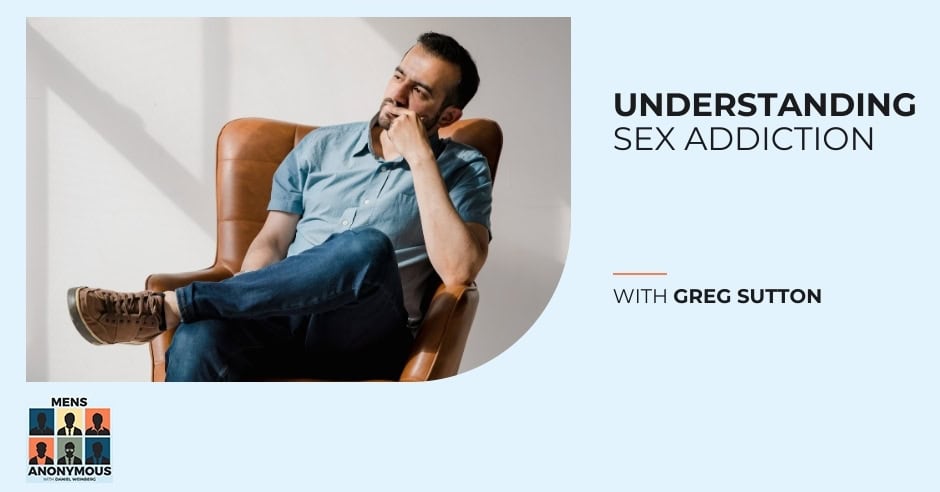
Up to 25 million people suffer from sex addiction, and they remain stuck in this unhealthy situation because of the shame and stigma surrounding it. Therapist, educator, and national speaker Greg Sutton is here to share his experience working with sex addicts and his role in guiding them towards healing. In this conversation with Daniel Weiberg, he explores the various aspects of sex addiction, from its potential causes to the most effective ways to treat it holistically. Greg also discusses valuable tips on how to deal with a sex addict partner and still keep a relationship going despite having such a serious roadblock in your journey.
—
Watch the episode here
Listen to the podcast here
Understanding Sex Addiction With Greg Sutton
On this episode, shall we have Greg Sutton, Sex Therapist, as we deep dive into the world of sex addiction.
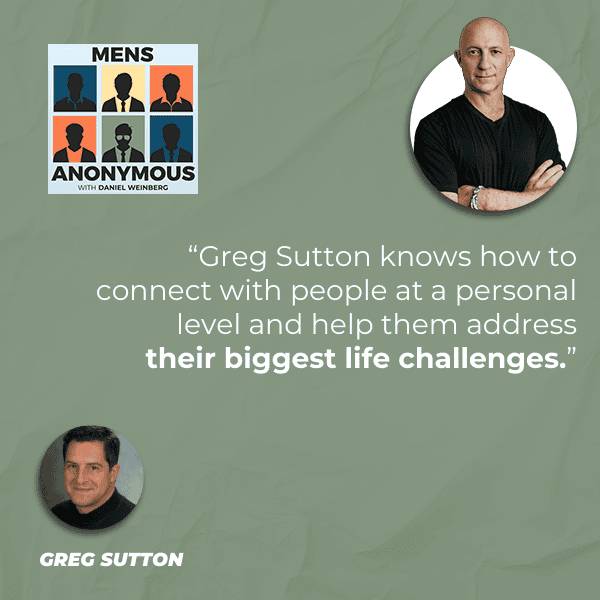
Greg, it’s great to have you on the show.
Daniel, it’s great to be here. Really appreciate
I’m very excited about this episode. Where are you in the world right now?
I’m in the Mountain time zone, as we talked about, in Boise, Idaho.
There is a thing called Mountain Time Zone. I was not aware, so I was getting very confused when Greg was trying to arrange the call with me. “I’m in the mountains.” I’m like, “Which mountains?”
Yeah, in Boise. I’ve lived few other places, Florida. I originally went back to school to get my Master’s and worked at several different clinics down in Los Angeles for several years, too, but ended up here.
You have been a therapist. Talk me through your professional career in therapy and how you got to where you are now.
How I got to it quickly is I was always into athletics and triathlons, and so I was in Management and then I went back to get my Master’s in Exercise Physiology. I worked at the Y as a health and fitness director and did that for a number of years. I also did personal training and oversaw that. I found that with the personal training, people were a little interested in weight and changing lifestyle things, but they would talk about their personal lives a lot. “My husband and I are fighting about this. My kids, we argue.” The personal training almost turned into like a therapy session, it felt like. I went back and did my own individual therapy, combined with that. I went back and got my Master’s in Clinical Psychology. That’s what brought me there.
Therapist And Speaker Greg Sutton
What we’re going to focus on and how I found you, Greg, is the area of sex addiction. When I got exposed to it through one of the guests we had on the show, he brushed over it, who you know. When I went back and reflected on the show and I thought, “He had a sex addiction problem,” I went down the rabbit hole myself on the space to understand what does that mean. When they talk about sex addictions, otherwise known as hypersexuality, and then when you really dig down, there is many categories or there’s a real spectrum of sex addiction.
If you just do it like a chatgpt, they’ll give you a variety of sex issues. You have compulsive masturbation, you have pornography addiction, you have cybersex or online sex addiction, anonymous or casual sex addiction, relationship or romance or love addiction, which I actually had a guest on to talk about that, which was fascinating. Prostitution-related behavior, so engaging compulsively, seeking out sex workers, voyeurism or exhibitionism. You go even more subcategory, which is fetishistic or paraphilic behavior.
Each type of sex addiction involves shame, secrecy, distress, and often co-occurs with other mental issues like trauma, anxiety, depression, substance use, etc. Not too dissimilar to other addictions, I guess. How did you stumble across, or how did you find yourself specifically getting exposed within the therapy space to this particular category of sexism?
Was it like one of your patients you had or clients that you had, and they opened the world to you on this, and then you went down the rabbit hole, or did you particularly study this in particular? One really interesting thing about it, which I know we talked about in our earlier discussion was around the fact that it is not considered by the American Psychiatric Association. It’s not actually accepted or defined as a disorder. They put out a they put out a manual on mental disorders. I don’t know how often they do it, but they update it every so often and that categorizes and they have rejected this particular disorder as a mental disorder.
I’d love to talk to you about that. Just for the audience to know, when you look at the stats, they say about 3% to 10%, very hard to gauge, of the general US population suffer from one of these subcategories, which is an enormous amount of people. Let’s call it 250 million people. We’re talking up to 25 million people who suffer from this. It’s not a very well-spoken about subject, obviously, given the shame and people don’t open up about it. Let’s deep dive and go down the rabbit hole of sex addiction/hypersexuality. That’s my intro.
You covered a lot there. Let’s see. Where do we want to dive in?
I want to dive in how you got into the space to start with because it’s not like something you woke up and said, “I’m going to go study sex addiction and be a sex addiction therapist.”
Sex addiction is often caused by little traumas like neglect and big traumas like sexual abuse. Share on XAs I alluded to earlier, my own therapy, I had issues around this and my own drinking. It connected me to my early childhood patterns and those types of things. The shame. I think it’s also a stroke of luck. When I was down in Los Angeles working, there are several different internships you can do while trying to get your hours to get your license.
I did several, but one was at a place called Sexual Recovery Institute and they work with sex addicts. I found that I connected with it. I have really enjoyed my time there. I happened to stumble onto two people who are huge in the field right now who are my mentors and who I can say are friends, which is Alex Katehakis and Rob Weiss. They have several books out.
What’s the seminal book in the space? If anyone wants to learn more, what would be the go-to book?
There’s just so many now because if you talk about some of the brain scans and the MRIs that we’re doing, Alex has a great book. It’s huge. It’s not an easy read, but it’s about affect dysregulation and the neurobiology of sex addiction. Backing up, the guy who is responsible for understanding all this was Dr. Patrick Carnes. In about ‘83, he wrote a book called Out of the Shadows. That’s, like you said, the seminal book that broke the ice and talked about this.
Common Causes Of Sex Addiction
Why don’t we start with the industry or the specialists within the space? Where does one see the source or the cause? Is it genetic? Is it something that you have from a trauma as a child? Talk us through how one actually becomes one of these categories or end up finding themselves to have the disorder.
I think you said the word earlier, and somehow, they really connect with shame. Either there’s a very rigid household and it’s very structured and authoritarianism and they don’t have that autonomy and that love and support and that type of growth, or it’s chaotic. They learn, much like with other addictions, “I’m going to have to take care of myself. I’m going to have to meet my own needs. I’m going to have to become self-sufficient.”
Those categories are what might breed addiction or even sex addiction. There’s also oftentimes a trauma. You hear about Big T’s and little t’s. A big T trauma might be like sexual abuse and a little T might be neglect or something like that. That can cause self-sufficiency and just alienates them or keeps them separate. They have to take care of themselves.
What is the most common of the categories?
Yeah, you brought up a lot of categories and it’s true. As with the cybersex, when the internet came out, you have this anonymity, this accessibility, there was no cost relatively. You didn’t have parental controls. Now we’re seeing these generations that were exposed to these really dramatic pictures that we can find on porn if we’re seeking that. That hits the brain at such a young age and there’s this connection or trauma to it, and so we’re seeing that.
You mentioned love addiction. That’s a subcategory. I can go into all of these to a greater degree. I think you also made an important point when you talked about voyeurism. When you get into the realm of, is that a sex addiction or is it sexual offending? Sometimes, those cross over. Someone can be a voyeur, expose themselves and also be a sex addict, but they don’t necessarily have to be a sex addict to expose themselves. Does that make sense?
Signs Of Sex Addiction
Absolutely. As I was reading about the space, I asked myself how does one know they’re a sex addict? For example, if I happen to go away on a romantic week away with my partner, and we have sex twenty times in the week, it sounds like it’s a big number or maybe not. What determines whether both of us or maybe one of us are sex addicts or not? Where do you draw the line? What is the test to say that you’re a sex addict? What are the signs? I enjoy sex a lot. How do I know I’m not a sex addict?
Now I think you’re getting it into the realm of a couple of things. One is I have the world of sex therapy. Have many friends in that world. I think early on, in the CSAT or the Certified Sexual Addiction through ITAP, which is the governing body. It has 3000 members over 35 countries. This group, the training that we did and that we took out into the community was viewed by the sex therapy world as sex negative.
What’s sex negative?
The intent was good, I think. We’re trying to figure out what’s the limits of sex addiction. If you do this, if you’re into BDSM, if you’re into these different lifestyles, are you a sex addict? I think sometimes, in the early days, maybe we, in the sex addiction world, tried to categorize a little bit more harshly like, “Okay, you could be a sex addict. Let’s stop that behavior. Let’s work on that. That’s out of control. If you have sex twenty times, maybe you’re a sex addict.”
We often associate love addiction with females. We assume they want to be clingy to a relationship and give up their social lives. Share on XI think we did a lot more refining the assessments of that. To your point, in the sex therapy world, and I can’t speak for them, I’m not a sex therapist, but yeah, it was a lot more sex positive. I like to hope that we, in the sex addiction world, have adapted that more, meaning, okay, we don’t look at having sex on a weekend twenty times as you’re a sex addict. That’s just who you are. It’s only when it hits these categories of more addiction-like behavior that we get concerned.
Can you describe some of the behaviors that you would see? Maybe answering my own question, but the way I see it, and I’d love to hear your commentary on it is, is that when the addiction itself, and it refers to all addictions, starts negatively impacting other parts of your life. For example, when I spoke to the love addict, he said that he knew it was an addiction. When he saw that, he was like, “I read behaviors of a love addict,” which means they will basically prioritize that behavior or relationship or activity over everything else. Meaning, they will sabotage business like their own employment or their own business. They will sabotage other relationships they have with family and friends.
In A Relationship With A Sex Addict
They just will choose that a above and beyond everything else, which is what you could say for cocaine addiction, for alcoholism, for any type of addiction. When I was trying to visualize, get in the head of what a sex addict is going through, can you be in a relationship with someone and only one of them is the sex addict? I’m going to assume, yes. I’m wondering, you must have patients, clients that you see that have a sex addiction, but their partner doesn’t, and it impacts their relationship.
How do you help them? What tools do you give them and maybe to their partner in understanding how to manage both the person who’s the addict? What are the things that they can do to help them control them, manage those desires and also to the partner who’s in the relationship who’s trying to help them not go past those boundaries?
There’s a lot there. I guess first, I’m hearing, “What does it look like?” That’s such a good assessment of the love addict. I love it that it was a male, because I think oftentimes, we associate love addiction with females.
No, this was a male.
Yeah, they want to be clingy to a relationship and they give up all their social things.
He was running five relationships, romantic, deep, loving relationships in parallel at the same time. You imagine like doing that with one relationship is just already like so much. If you’re really deeply connected, that’s a lot of energy and head space and heart space that you’re putting in something. Imagine running five in parallel.
If you look at the old circle the pot with the pie slices, I think that’s what you’re talking about. It’s like work becomes this little sliver and then social activities become this little sliver or now something pops up with if you pursue a prostitute and get arrested or you get a DUI because you’re out drinking and then you drive over to somebody to get that connection that hit. Yeah, the pie slices, the addictive behavior, it starts to take up like half the pie. A lot of times, I get people in because the partners find out about the behavior.
Find out because the person, the individual, is having sex outside the relationship, so they’re just trying to satisfy themselves just more regularly. I guess, and they find out. That’s one way.
Yeah. It’s not just, “I want to have more sex.” There’s a compulsive nature to it. It’s not just bad behavior, it’s, “I have to have this.” That’s where they start to get into the hiding and the shame, the secret activities. Whether it’s they go down to bookstores and act out anonymously with other men or prostitution or just the online, hiding the porn. It’s hiding it from the partner and the partner typically finds out. Sometimes, when I get the call from the partner, like, “I just found out he’s been messaging back and forth with this prostitute,” or, “I found his porn stash,” or, “He’s racked up all these bills for phone sex.” Those things, that’s the behavior that gets called out.
How The Internet Contributed To Sex Addiction
Would you say that the proliferation of technology and the exponential growth of accessibility to material, whether it be webcam, porn, cyber, has basically led to a huge growth or contribution to a huge growth in sex addiction?
Yes, without a doubt.
Can you earmark the age groups it affects most and male or female, or both?
Both, but there again, typically, female might look more like a love addict. Those are some of the groups that spur out of that, the 12-step support groups I know. We can get into that in a little bit. With men, it’s pornography.
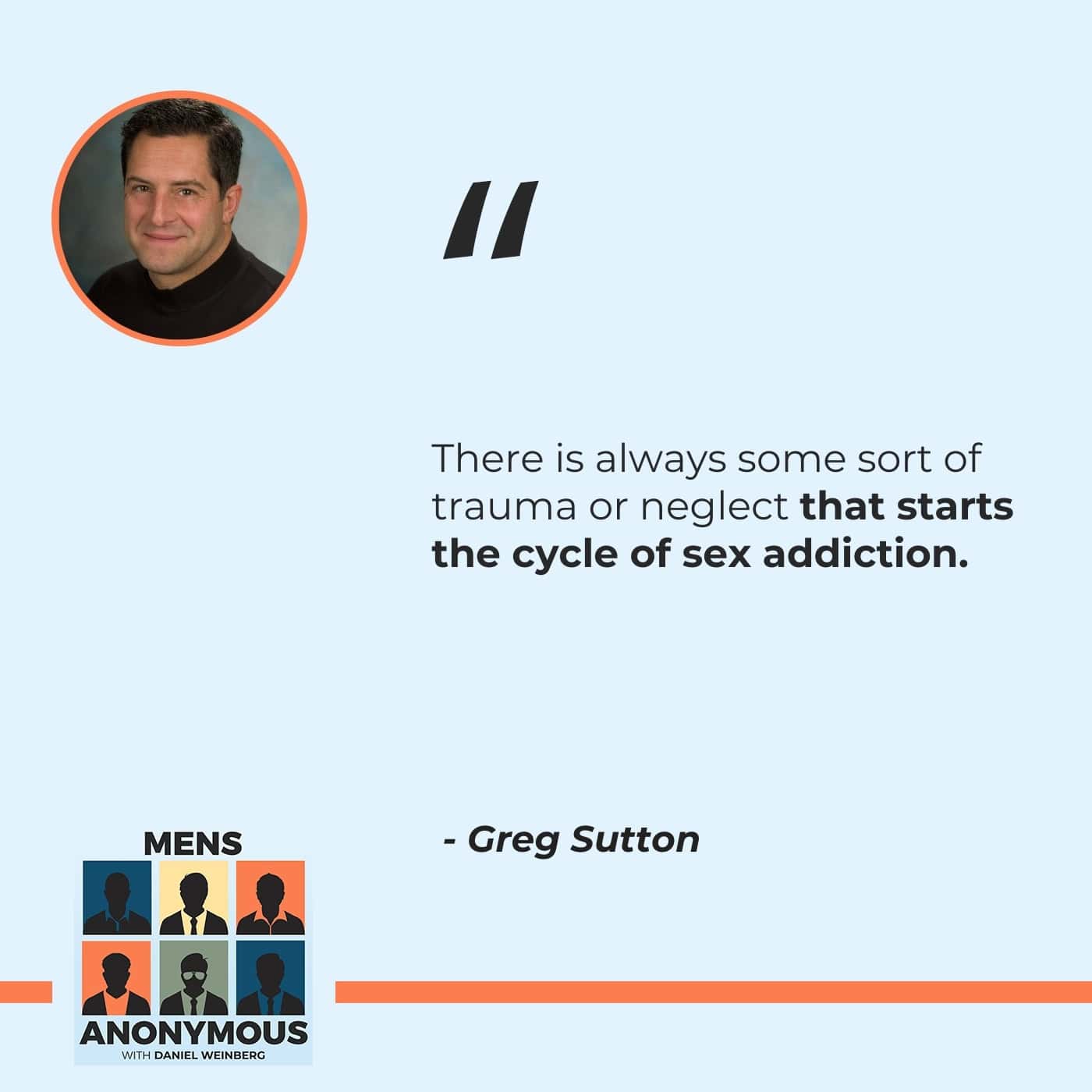
Is this an 18-year-old problem or is this a 40-year-old problem?
That’s a good way to put it.
Is it someone who’s married with kids and getting on with life, or is this like a kid who’s just hypersexual because he is got a lot of testosterone and he is super excited because he is discovered himself?
That’s harder to diagnose. It emerges into the 20s or 30, back to that pie slice.
You’re saying it becomes more apparent that it’s a problem when you get to a point in your life, let’s call it 40, where you’re more mature, more serious where there are other things you should be focusing on, like career, potentially family, having a home, etc. When it’s at that stage and all those desires or that activity still as desired as it was 15, 20 years ago, that’s when it becomes, “This is a problem.”
I hate to put the numbers on it, but I think there is that tendency. In the twenties, people write it off as, “I just have a high sex drive,” or, “I like the variety of partners.” I think that’s when it gets more difficult when you have other real-life things that one takes on as you get older and then those get ignored or blurred or it’s non-traditional or you start to see this distinct pattern.
What tools do you give the individual who is being challenged by this or has the disorder themselves? What tools do you give the partner in helping to manage? You talk about shame, so obviously, you don’t want to encourage the partner who’s dealing with this to make them feel more ashamed of what they’ve done. That is almost like a self-fulfilling prophecy, “This is why I am like this because I’m being shamed,” but it’s also, I can only imagine, a very difficult thing for a partner to be able to deal with a partner who you’re in a romantic relationship with someone who has this. It must be very difficult.
A lot of times, I get the call from the partner who’s losing their mind like, “I thought I knew this guy.” It’s not always a guy. “I thought I knew this guy and he has this secret life and all this is coming out and I don’t know him. I am traumatized. He might be having sex with other people and then coming to our bed and having sex.” We could spend a whole hour on the partner. They’re devastated, but oddly enough, statistically, they typically stay together. I’d have to look at the newer research, but I think it’s like 90% of couples. The sex addict wants to work on the issue and stay together. It’s a pretty high number.
Medications And Treatments For Sex Addiction
We start off, in the beginning, talking about there’s the different treatments, let’s say. There’s medication. I want you to talk us through what medication you’re talking about for sex addiction. A lot of my understanding is there’s a lot of different anonymous groups like Alcoholics Anonymous. You’ve got a variety with sex and porn, just sex. There’s a whole lot of subcategories. Do you want to maybe explain to us how do you complement? You are doing the therapy. It’s obviously a very holistic approach to it. Maybe talk us through what’s the overall strategy?
First, in the assessment, you have to get an idea of what we’re dealing with. I can do the first session and say, “You’re off to rehab. This is so profound and it’s so and intrusive to your life and you’ve caused so much chaos that you need to do 30 days in an inpatient center or at least two weeks at an outpatient center.” Something like that.
Do they specialize in sex addiction or just as just a general addiction outpatient?
Sex addiction. There are specialties of specialties. There are people like Rob. There were tracks of gay men who act out sexually on crystal meth. There are specific tracks that you can do in cohorts where you can attack these different addictive behaviors that are very specific. They’re standalone. There are a lot of clinics out there now.
As you mentioned earlier, the percentage of people who may be having some out control sexual behavior, back to the terms out of control sexual behavior, porn addiction, some of the religious places like to call it porn addiction that encompasses everything because they don’t want to call it sex addiction. There’s sexual compulsivity. There are different names for everything.
Medication, too. This is an impulse control disorder, too. “I have this feeling. I don’t want to have to feel this feeling so I act out to get out of it,” and then you’re in the addictive cycle and then I feel shame. I want to act out to get rid of the shame. A lot of times, like an SSRI, like a Effexor or a Prozac, those can help one tolerate feelings to where they don’t have to act out and they can look more, then we can look more at the root cause of what’s happening.
If you have grown up with controlling, abusive, and dismissive people, you are more likely to be attracted to similar individuals, and that is not really healthy. Share on XAs with other addictions, is this something you believe that one needs to work on for the rest of their life? You’d never truly beat it. It’s like they say, alcoholics, they can never have a drink, really, because if they started, we’ll just take them back there. Cigarette smoking, cocaine, all of it. As a sex addict, sex is a natural part of life, especially if you’re in a romantic relationship.
If you enjoy sex and you’re a sex addict, yet you want to make love to your partner as regularly, it’s quite unique in that you are still going to carry on the activity because it’s a natural normal activity. It also has the ability to potentially trigger the addiction again, because you are engaging in the very act you’re trying to trying to, I guess, minimize or eliminate the addictive nature of it. The actual individual, it must be a very fine balance of juggling, “Am I being addictive right now? Is this okay?”
That’s a whole category of what is healthy sex? What is sex in recovery? It’s akin to eating disorders. You have to learn to have a healthy, loving relationship with your body and food because you’ve got to eat. You’re right. Healthy sex, that’s a really difficult part. I think early on, we did a good job of working with the childhood things that may have caused the addiction. Go to meetings, do the therapy, do some groups, really get that under good control.
However, what was healthy sex? Especially when you talked about some of the fetishes. Someone who’s into whips and chains, is that sex addiction? Not necessarily, but if it would get to the point where there’s sex addiction involved, can they go back to that fetish in recovery? It gets to be really tricky. The answer is yes.
If you really work on what’s going on and which part are the addictive behaviors that take you and get you into what we call the bubble, which is like the drug addict where the prefrontal cortex is shut down and I’m just seeking my drug. I’m scrolling through the prostitutes to see which one I like, which one I want. I’m looking for that perfect hit to orgasm to.
Common Characteristics Among Sex Addicts
Do you see common themes or characteristics in terms of like the source or the cause of how they got to where they got to or is it very bespoke? Do you find that the actual addiction itself is very personal and it’s almost like a tailor made for the individual or are there a lot of commonalities that you can draw from?
Typically, something goes back to childhood. I hate to be cliché. It’s always something with mom and dad. Back to that trauma, it’s something that mixes up like an overly dictatorial father. You don’t get that connection but that is your father and there is that connection. As you grow older, it can be you’re attracted to people who may be similar to that. That’s type of behavior, but it’s not really healthy, necessarily. That person can be controlling, abusive and dismissive.
You then find yourself in that pattern of, “I don’t want to be with this person, but this is the person that I connect with intimacy or that loving bond.” You mix up with your beans and your rice. It doesn’t always have to be a person either. A trauma bond can be a female who has her period and there’s trauma around that. She’s ashamed.
Maybe she’s being sexual with a boy or something. Now there’s trauma around that. It doesn’t mean they’re going to have trauma around that, but sometimes there could be, “Okay, so now I don’t have sex. Now I don’t have sex when I have my period.” There’s always some goes back to some trauma or neglect that connects that, that starts that cycle.
In your field, then, basically, your job is to try and understand that to begin with. Help your client understand that because I guess that’s the way to get them on the path to understanding what they’re going through and how they can overcome it, I guess. When I hear medication, the medication can be complimentary, but taking Prozac, I feel like that numbs you as opposed to truly understanding where you are and why.
That’s a good point because I’m not trying to snow this person over where they’re walking around like a zombie. The goal is to get them to be able to tolerate a feeling enough to don’t act out. When they’re not acting out, “I have to sit with these feelings,” they come into the office for that session, “I have to talk about what I’m beginning to discover about myself. I don’t want these feelings. I maybe associate that feeling with childhood. This makes me sad.” We can sit in the room. We’ve talked about shame, but also secrecy. There’s so much shame, so they keep the secret so they don’t talk about that childhood stuff. It’s the number one rule. Don’t get caught. Keep it a secret, because if anybody knew about this, they’d know that I’m this horrible abomination.
Do they typically not share this even with friends? It’s like no one knows it in their life.
Right. This is their secret life, almost. It can be, depending on what their acting out desire is or their fetish. Nobody knows. Maybe just the partner.
Does a high percentage of the cases tend to involve other substances? You mentioned before gay men on crystal meth. Does sex addiction in general tend to have something with it? Maybe alcohol or drugs or can you have just pure sex addicts, zero other substances that that is their thing?
Sex addiction is a secret life. Nobody knows that they are acting out on their desires or fetishes. Share on XIt depends on what your thing is. A lot of the times, if I start to drink and I’m feeling feelings or feeling lonely or I can drive by this area of town where there are prostitutes and I might not normally drive by that part of town looking for a prostitute unless I’m drinking. That frontal lobe shut down a little bit more. The impulse control is nil. There are so many rituals, too. I worked with a guy who, and this is some childhood stuff too, would go to Goodwill and buy female clothing, dress up and go into abandoned buildings and look for men to have sex with.
He’s a man who would go and dress up as a woman and then go into an abandoned building just to have sex with a stranger, basically?
Yeah or people go to parks or the bookstores, those kinds of things.
What’s the bookstore thing? You mentioned that before.
It’s where you can go in and in and maybe a section of it. There are little video booths that you can go watch porn and then cruise that and hook up with each other.
Is this as prevalent in the heterosexual and the homosexual spaces sex addiction?
Yeah. There are a lot of crossovers, too. This one client I worked with, he was going to these porn shops and hooking up anonymously with men. His partner brought him in. I’m telling her and he’s telling her, “This is what I’ve been doing for the last five or some years.” She had no idea. He also had an affair with a female. I remember the partner was so preoccupied with the affair. I’m like, “He’s getting blow job, anal sex unprotected with all these men multiple times a week, and you’re focused on he had an affair,” just because that was personal for her. It’s not like she wasn’t concerned, but it was who was the affair with? Do I know her? It was just like, “Do you see this other thing over here?”
Keeping The Relationship Intact
Coming back to what you said earlier on, which was that a majority of the cases that you’ve overseen, the relationship stays intact. They work through it.
This couple did, too.
That’s fascinating that your partner’s gone and is having sex with male strangers in a porn shop for five years, and you are willing to stick it out and understand and be compassionate and have the patience and the time. That’s lot that the partner has to deal with. Yes, the person with the addiction, they’re also dealing with a lot, but the partner, that is not insurmountable.
It’s so much to ask of the partner and they’ve been playing detective for years because of probably a lack of intimacy, connection, attention, and trust. That’s a big one. If you think about it, if someone has some secret heroin habit or cocaine habit, or they’re an alcoholic, maybe it doesn’t come out until they get a DUI or they get busted, and then that’s presented to the partner and it’s not okay or understandable. “okay, I’ve been hiding my alcoholism and now here’s my drinking history.” The partner’s probably upset, maybe devastated, but in some ways, it’s not as personal as this. That’s just coming up saying, “I’ve slept with all these people over the years.” That’s personal. That hurts.
That’s why I’m actually quite blown away that you have a high success of relationships recovering from that because a normal infidelity, I’m not sure it does.
Depending on the circumstances. I think they’re going to do a lot of couples’ work. That’s more of a symptom of the relationship. After everything’s out and open it’s like months later, we can look at, “We weren’t connected, we weren’t talking, and neither of us was trying to do something about that in a healthy way.”
Therapists In Need Of Other Therapists
To finish up, my understanding within the therapy industry is that therapists themselves, those who need support from other therapists because of some of the complexity of the cases that you go through. If you’re doing a lot of these cases, most of your cases would be highly complex. I can only imagine in the sex addiction sphere. No?
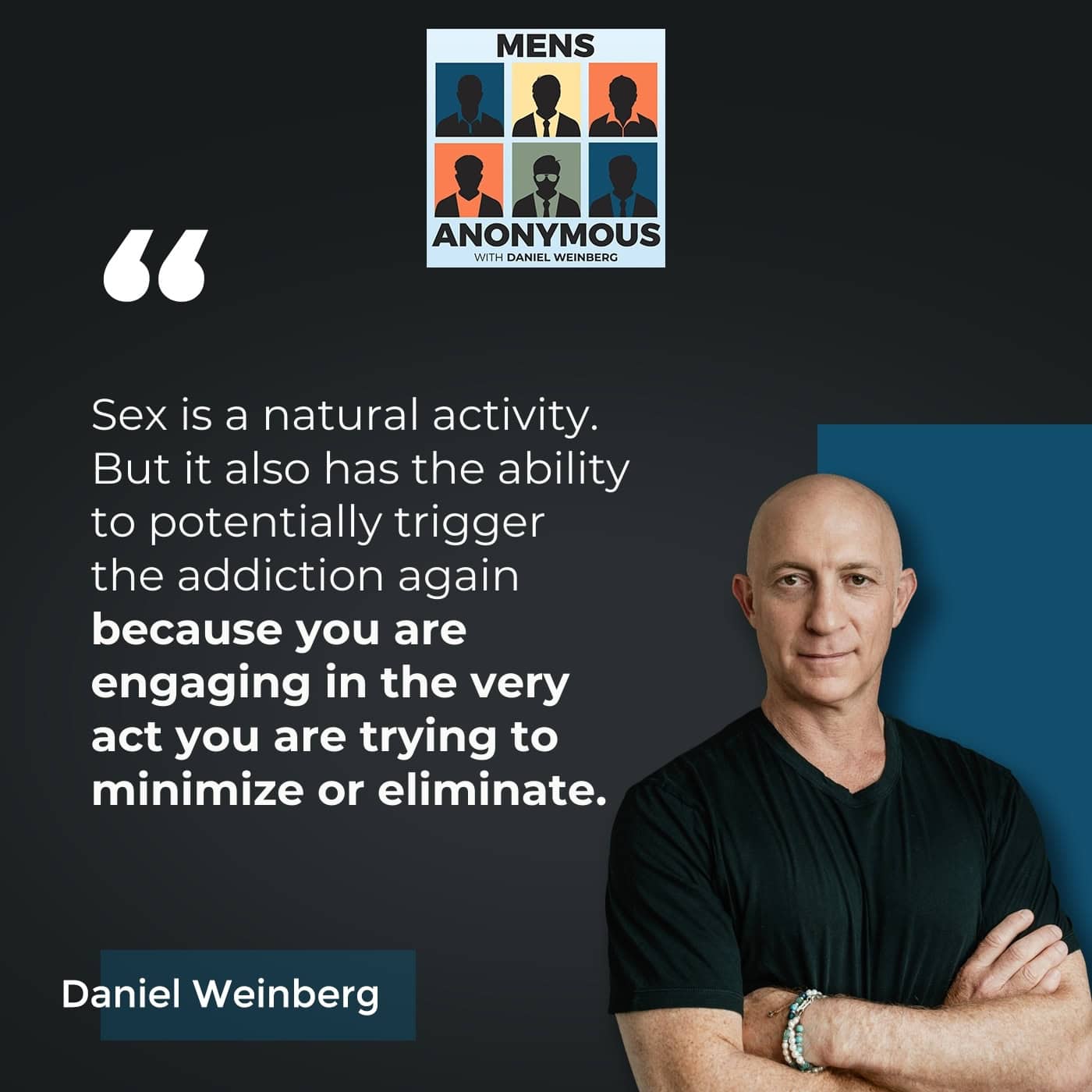
It’s a mixed bag. I think it gets a little more dicey if they’re on the edge of offending behavior as well as sex addiction that can get, because then you have legal things to deal with. Obviously, when you get to people who are well known in your community, elected officials or ceos or stuff like that, that can complicate things as well.
Yeah, definitely. I really appreciate your time on this. I think it’s a fascinating topic. It’s a lot to process and but I think you definitely shined a light on the space and where it can all go and how much it can affect, like what you just said there, being a CEO or an official. The knock on effects we talked about, it affects up to 25 million Americans, let’s say. It most will be then affects another at least 25 other million Americans who are either family members, partners, etc. It has a huge impact on society, this particular area. It’s really not well spoken about. It is still in the shadows.
Answering Five Quick Questions
There may have been a book that said Coming Out of the Shadows, but it’s still very much within the shadows. If I speak to any friends or peers, they really won’t know much about the subject. I really appreciate you sharing some of your wisdom. At the end of my show, I always like to ask my guests five quick fire questions to be, if you’d be so kind. My first one is, who would you like to say sorry to, given the chance?
There’s some previous relationships that I think I was not loving and attentive and caring. Romantic relationships.
What are you proud of being or doing in your life?
I’d say this work. I’m proud of being a parent, of course, but doing this work and helping people.
When did you receive kindness while needing it most and expecting it least?
A teacher taking support. Pablo, my seventh-grade teacher. He really took me aside and got me on the right track.
What did your mother or father teach you that you frequently remind yourself of?
They’re good people. To be good people to other people. To be loving and kind and caring.
You’re certainly doing that in your profession. What is your superpower?
I’d probably say connecting with people at an important level, when it matters.
Greg, I really appreciate you coming on the show. I look forward to chatting again soon.
Thank you, Daniel. I appreciate you having this forum for men to be able to talk about these different issues. I really appreciate it.
Important Links
About Greg Sutton
 Greg Sutton, LCPC, CSAT, is a therapist, educator, and national speaker currently based in Boise, Idaho. After years of practice in Los Angeles, Greg now works with individuals and groups addressing issues related to sex addiction, love addiction, and trauma. He has trained extensively with leading experts in the field, including Dr. Rob Weiss and Dr. Alexandra Katehakis, as well as Dr. Patrick Carnes.
Greg Sutton, LCPC, CSAT, is a therapist, educator, and national speaker currently based in Boise, Idaho. After years of practice in Los Angeles, Greg now works with individuals and groups addressing issues related to sex addiction, love addiction, and trauma. He has trained extensively with leading experts in the field, including Dr. Rob Weiss and Dr. Alexandra Katehakis, as well as Dr. Patrick Carnes.
With two decades of clinical experience, Greg has been invited to speak at institutions such as the University of California system, Boise State University, Idaho Health and Welfare, the Idaho Counseling Association Conference, and a range of treatment centers and community events throughout the western U.S. His work focuses on helping people understand and heal the deeper emotional and relational patterns that drive addiction and intimacy struggles.

